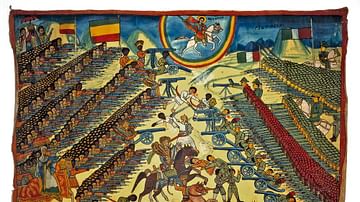Search Articles
Browse Content (p. 4)

Article
Hegra and Jabal Ikmah, AlUla, Saudia Arabia - Two different but stunning archaeological sites on the ancient incense trail
Although 30,000 archaeological sites have been identified in the AlUla area of Saudi Arabia, only 8 are currently open to visitors: Jabal Ikmah, which has hundreds of inscriptions; Hegra, a massive site settled during the Nabatean and Roman...

Article
Battle of Stalingrad - The Destruction of Germany's Sixth Army
The Battle of Stalingrad (now Volgograd, July 1942 to February 1943) was an attempt by Adolf Hitler (1889-1945) to control the USSR's access to the Caucasus oil fields. Fierce street-fighting by the Soviet Red Army saw the city withstand...

Article
Italian Colonialism in Eritrea
Eritrea, located on the Red Sea coast of the Horn of Africa, was the ‘firstborn’ colony of Italy. The potential of a trade centre and naval base at Assab first attracted Italian interests in 1869. The Kingdom of Italy, however, did not officially...

Article
Education in Roman Spain
There was no compulsory state education for children in any of the western provinces of the Roman Empire. The primary sources are sparse when it comes to the education in Roman Spain, and while some scholars argue for a network of schools...

Article
Battle of Edington
The Battle of Edington, fought in May 878 in southwest England, saw Alfred the Great, King of Wessex (r. 871-899), win a decisive victory over the Viking leader Guthrum (d. 890). Two weeks later, under the terms of the Treaty of Wedmore...

Article
Fear of Insurrection
Fear of Insurrection comes from Incidents in the Life of a Slave Girl (1861) by Harriet Jacobs (l. c. 1813-1897) describing the reaction of the White community of Edenton, North Carolina, to news of Nat Turner's Rebellion in Southampton County...

Article
Battle of Moscow in 1941-2 - The USSR's First Victory
The Battle of Moscow (Oct 41 to Jan 42) was Germany's first major land defeat in the Second World War (1939-45). Although Axis panzer divisions reached within 20 miles (32 km) of the Soviet capital, the USSR's Red Army, led by Marshal Georgi...

Article
Notes on the State of Virginia
Notes on the State of Virginia (1785) is the only full-length work by Thomas Jefferson (l. 1743-1826) published in his lifetime and was written in response to questions from France regarding the thirteen states that formed the United States...

Article
Poems of Phillis Wheatley and Jefferson's Criticism
Although Phillis Wheatley's poetry found an audience upon publication, it was not well received by everyone and some, notably Thomas Jefferson (l. 1743-1826), dismissed her work entirely as "mimicry" since, according to the prevailing understanding...

Article
Christian Celibate Martyrs
Martyrologies, a unique genre of Christian literature, appeared from the 2nd century CE. A martyrology tells the story of the suffering and ordeals of a Christian martyr and details their trial and execution. A shared element of martyrologies...